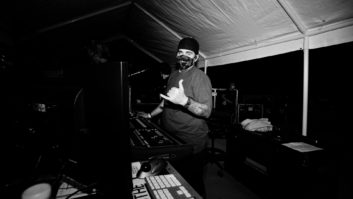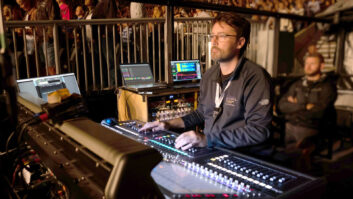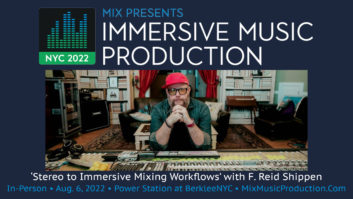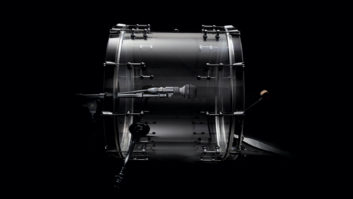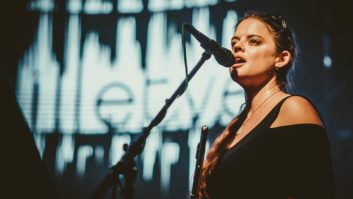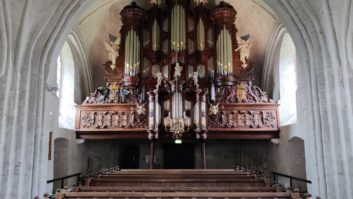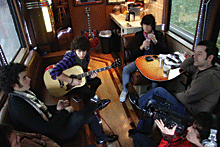
Forget all those screaming girls, crying and pulling their hair out over Kevin, Joe and Nick. With the exception of their parents, teen sensations the Jonas Brothers’ biggest fan is probably their producer, John Fields. So when the Jonas Brothers asked him to produce their upcoming — and at press time still untitled — third album, he jumped at the chance to work with the group again — even though it meant doing the actual recording on a tour bus. A rolling tour bus. “There have always been mobile recording trucks, but usually not while they’re moving!” he says with a laugh.
Because the Jonas Brothers spend almost all their time on the road, it’s virtually impossible for them to stay in one place for more than 24 hours. Fields and Dorian Crozier, who also played drums on the Jonas Brothers’ 2007 Platinum, self-titled second album, met up with the trio in Toronto, where they were making a movie. “We set up shop at Cherry Beach to cut what became the first five songs on this new album,” says Fields. “We needed a bunch more and we’d have a record, but they were on the Hannah Montana tour. They asked if I’d go on tour with them, and I said, ‘In what capacity? And when?’ They said, ‘To cut new songs; we’re thinking about getting a tour bus from Gibson to use as a mobile studio.’”
Fields agreed but admits that his next thought was: What have I gotten myself into? “I knew I would not be able to do what I normally do,” he says. “In my studio, if I think of something, I can go through any plug-in, or analog EQ and compressor. But I had none of that. I was limited to guitars and little dinky keyboard sounds, but it was refreshing to use new stuff and get fresh sounds.
“It started off with Dorian and me scheming about how to make it work: ‘We’re going to bring everything: eight compressors, 10 mics.’ ‘We’ll bring your speakers, my Mac!’ Weeks go by and you whittle down: ‘Maybe I won’t bring my full-blown Pro Tools HD system. There’s got to be a better way.’”
The Gibson bus is fully equipped with a shower, appliances, wood floors, guitar hooks on the walls and built-in amps allowing for quarter-inch cables to be plugged in. “I built a mobile recording rig with my laptop — a 15-inch MacBook Pro — and [Digidesign] Mbox Pro 2,” Fields explains. “I’m used to Pro Tools HD3, but because of space limitations the only way we could do this was to put together a vocal chain, a Line 6 Pod X3, an Edirol PCR M30 MIDI controller and the guitars on the wall to do the next group of songs on the record. I had an API 3124 mic pre, AKG 414 mic, a Shure 58 that we used a lot, a pair of Mackie speakers and Big Knob, a Distressor, a couple pair of headphones, a couple of big duffle bags of wires and stuff, and an alternative rig with Dorian’s Roland VK MIDI drum set we built into the back lounge. Dorian also had an Mbox and his Mac, and sometimes he used Logic 8 for certain sounds.
“I would make a rough track to click, send it to him, he’d bounce me a file and we’d use it as temp drums until we went into a real studio to re-cut it,” Fields continues. “We used iChat to send files between our rigs. I’m so glad we did it this way. It was great to cut these songs and hang with the boys in their tour environment.”
The Jonas Brothers’ schedule had them either driving in the night before a gig or staying in a hotel, and either way arriving at each venue around 8 or 9 a.m. Consummate professionals, they run a very tight ship of in-person and telephone interviews, appearances, soundchecks, performances and recording, with no time for distractions or anything not related to work.
Fields and Crozier watched first-hand and were impressed by the level of workmanship. “Dorian and I were in the bus, enjoying watching this spectacular tour up close,” says Fields. “There were hundreds of people on that tour having a blast and playing music. They would go onstage every night at 7, play, drive to the next town on the Gibson bus, and we did 8 or 10 days of this. The last stop was in Phoenix, [where] Studio Refferals’ Ellis Sorken booked us Salt Mine Studio in Mesa. We spent two days there cutting drums, adding guitar parts and redoing some vocals. But the bulk of the record was done on the bus, sometimes recording while driving, shaking on the bus, the laptop sliding, the guitars flying around, but we kept tons of material. When parked, we were on generator power and it had a nasty hum, so sometimes we had to retrack a vocal later, but in a loud rock song not so much; if you listen close, you might hear the hum on a song or two. After the tour ended, they came to my studio, Wishbone, in L.A. to tweak everything and cap it off for mixing.”
Fields, a Boston native, has had his hands in the music industry since childhood. His uncle and mentor, superstar producer/songwriter Steve Greenberg, wrote, produced and performed on Lipps Inc.’s 1980s mega-hit, “Funkytown.” Based in Minneapolis, Greenberg would take Fields to the studio with him when the youngster visited and got him into making recorded music.
“We built a nice studio called Funkytown, and I was the local guy who could make your album for $500,” he recalls. “I played in bands and had a huge network of friends and musicians. I began producing major-label records in the late 1990s. I did Tina and The B-Sides in 1997, Dovetail Joint in 1998, then Evan and Jaron in 1999. My manager, Frank McDonough, who was in L.A., suggested I move there, and finally in 2002 I did.
“Within the first few months of getting to L.A., I produced Switchfoot’s The Beautiful Letdown. We did it in eight days. It was my first hit major-label record, and it sold 2.5 million copies. It was a perfect match of band and producer.”
Fast-forward five years: The Jonas Brothers sign a record deal and, as huge Switchfoot fans, request Fields as their producer. Their A&R representative, Jon Lind, called Fields that afternoon, pointed him to the Jonas Brothers Website, set up an immediate appointment and sessions began the following week. All it took to reel him in, says Fields, was to sit in a room while the trio played acoustic guitars and performed their original songs. The album Jonas Brothers was cut in four weeks in L.A. at Seedy Underbelly. “It was one of the most fun times I’ve ever had in the studio; everything was so positive and there was zero stress,” says Fields.
And the Jonas Brothers have just as much praise for Fields. “From the beginning, we connected with him,” says Joe Jonas (who’s 17). “Since the first song we did together, he has always been open to our ideas, almost as if we were co-producing.”
“John loves music and is very open-minded,” 14-year-old Nick Jonas agrees. “He’s very fast, which helps us because we work fast, too. During the recording of our first album we really became close. John is like another Jonas Brother, and I think that’s why we got such good results with him.”
“We’re very hands-on as a group,” says Kevin Jonas (the elder statesman at 19). “We write and build our songs, and when someone once asked John how he does this, he said, ‘I just listen to the boys,’ which was such an honor for us. Sometimes you meet somebody and it just works perfectly right away. The connection was there for all of us from the start.”
Youngest sibling Nick Jonas began his career at age 7, starring in Broadway musicals. He was signed to a record deal when he was 11 and subsequently brought his brothers with him. Several years later, the trio was snapped up by Hollywood Records, which is when Fields entered the picture. Producing a radio-oriented, hook-laden pop band is second nature, he says. “It’s easier for me because that’s what I do naturally. My instincts are in pop and it’s natural for me to want the instruments and vocals to intertwine perfectly. I love the arrangements of classic radio hits — especially the vocals. I’m a huge Todd Rundgren fan. I like to think he was the architect for what I do now: superpop music with emotional vocals, with a side of ‘anything goes,’ as long as it sounds cool.”
It’s easy for anyone over the age of 20 to turn their nose up at teen bands, dismissing them as passing fluff whose stardom will be extinguished once their fan base is old enough to order a beer. The Jonas Brothers are fully aware of this. “Yes, we do have that ‘pop’ appeal in the sense of fan reaction,” says Kevin Jonas, “but we write our songs, play our instruments, and when you see us live you get the gist of who we are. It’s always a fight when you’re young, especially when you come along with the Disney background. But that has helped to push us to another level. We have always embraced our audience and where they’ve taken us, and we’re not going to try to run away from it.”
